
The Good, the Bad, and the Questionable – December 2020
In this Insight series we look at some of the best (and worst) online experiences our team has encountered.
Editor’s Note: This is a guest contribution from Gen Furukawa, the Co-founder of Prehook. If you enjoy this piece, please hit Gen up on Twitter and let him know what you think.
In this installment of The Good, The Bad, and The Questionable, we will examine how ecommerce brands use quizzes to create a customer experience.
A quiz is a powerful tool to offer an engaging shopping experience. In exchange for answering a few brief questions, the shopper expects to receive a more personalized and relevant experience on the site. And often this includes sharing an email address, which ensures that the merchant can send relevant campaigns.
In fact, 83% of consumers are willing to share their data to create a more personalized shopping experience. And 71% of consumers will feel frustrated when a shopping experience is impersonal.
So let’s dive in to see the good, bad, and questionable ways that ecommerce sites will use a quiz!
Disclaimer: This is not meant to undermine and criticize unsuspecting ecommerce websites. It’s simply meant to recognize great work, and provide a constructive commentary from a data point of one. And Teddy Roosevelet said it best anyway: “It is not the critic who counts…the credit belongs to the man who is actually in the arena, whose face is marred by dust and sweat and blood”
The Good Experiences
The Good: Get Personal(ized) With The Quiz
One of the primary benefits of a quiz is to learn more about the customer: their goals, challenges, preferences, objections.
The Farmer’s Dog is a direct-to-consumer dog food brand, with a unique spin: all food is prepared specifically for each dog with “real food” that humans would eat. Not surprisingly, the cost of such food is going to be significantly higher than dried kibble that you’d get at a grocery store.
The Farmer’s Dog quiz is a three-step quiz, to learn more about the dog (breed, age, activity level, health issues, etc). And then a recommended plan is presented, based on all of the data points gathered in the quiz.
There is one question that is especially interesting here: where does the customer stand in the customer journey?
Do they need convincing that they need the product (and thus willing to spend more)?
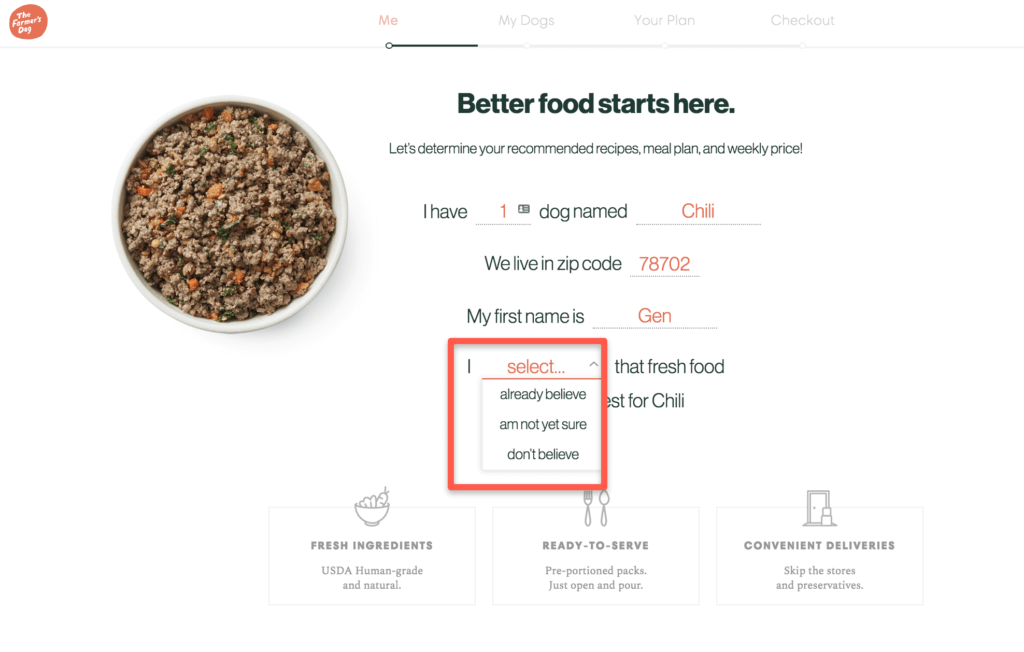
The answer to this question can be invaluable in terms of segmentation in their CRM. The subsequent messaging, channels, and campaigns should differ based on their answer to this question.
For example, those who are not already convinced of the need to feed their dog freshly-made food can benefit from education about the health benefits of a good diet, and negative side-effects of mass-produced food.
Moreover, The Farmer’s Dog also has specific details about Chili’s breed, activity, health issues and much more, so they are armed with lots of information to create a compelling campaign if I do not purchase in that session.
However, you do not necessarily need to be creating custom products for each customer in order to create a personalized experience.
Finn, a nutritional supplements brand for dogs, creates a personalized experience for each dog based on their quiz. However, Finn only has four products:
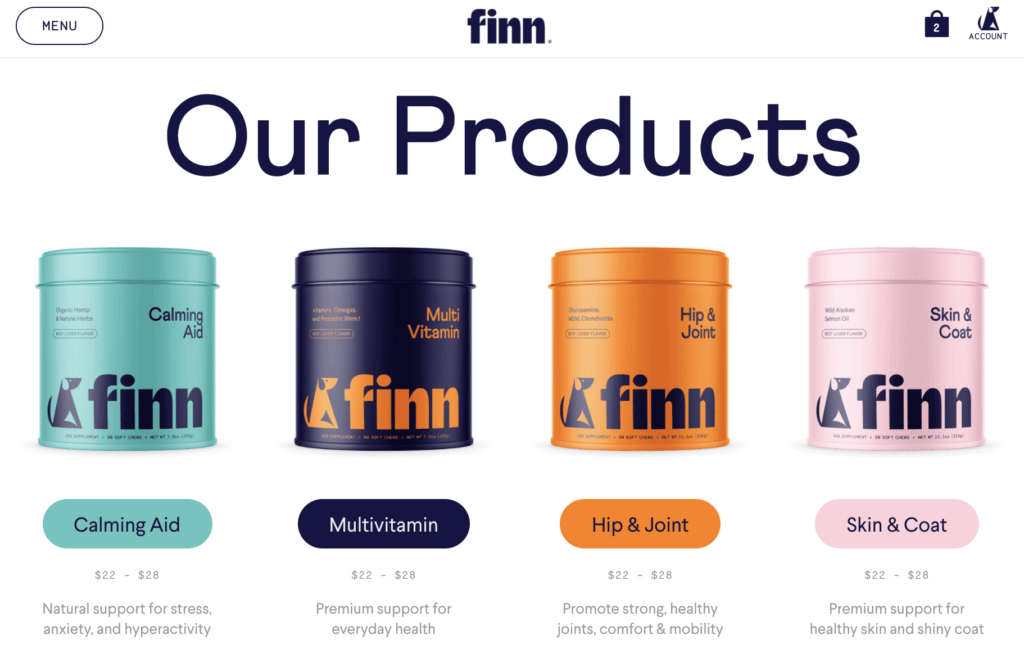
Yet, going through the quiz, there is a personalized plan for my dog based on the data points gathered in the quiz:
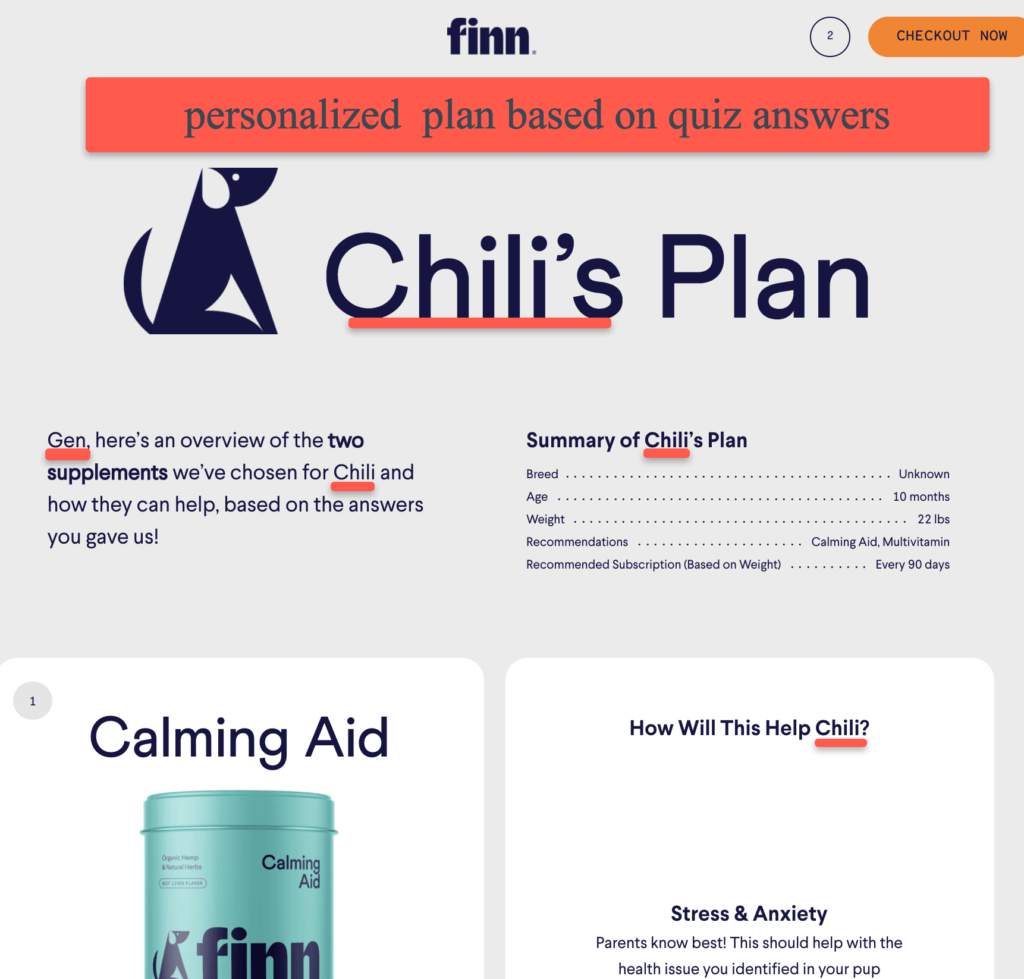
The recommendation is likely calculated based on my answers to a few questions, yet by showing the answers to the quiz, and adding in my name as well as my dog’s name, the recommendation seems far more credible. And personalized.
91% of consumers say they are more likely to shop with brands that provide offers and recommendations that are relevant to them. This quiz experience and the personalization that results is a great way to build a customer relationship–and develop it over time with the data gathered.
The Good: Guide Shoppers To The Product They Want, Faster
The amount of time in front of a screen has only increased during the pandemic. Not coincidentally, the idea of blue light-blocking glasses came up on my radar.
Felix Gray sells only blue light filtering glasses. They carved out a niche as the “Warby Parker of blue light glasses”….until Warby Parker became a direct competitor with their own version of blue light glasses.
One difference between the two is how they guide shoppers to the most appropriate pair: Warby Parker uses an interactive quiz, Felix Gray with text (and a bit of frustration).
Quizzes are particularly helpful when there is a large number of SKU’s, and the choice can be overwhelming to shoppers.
To address this, Warby Parker has a simple 8 question quiz:
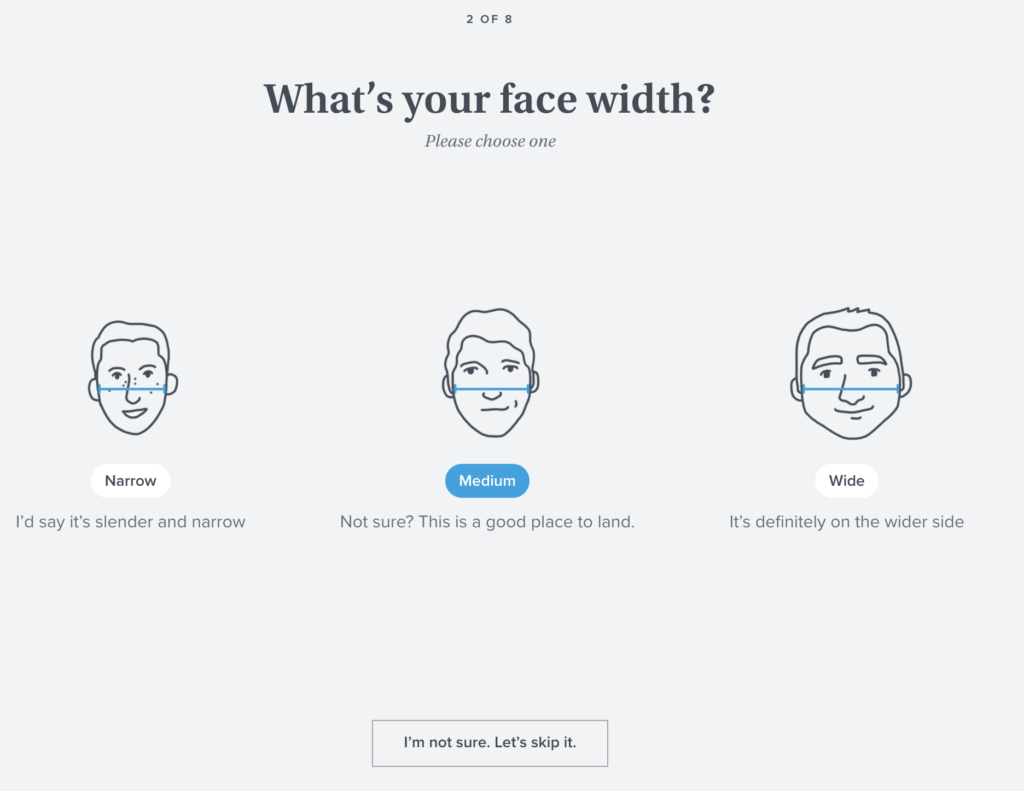
After just a few seconds clicking through a preference in glasses shape, color, material, prescription, I have the option of adding an email address and then presented a selection of options that work for me based on my quiz results:
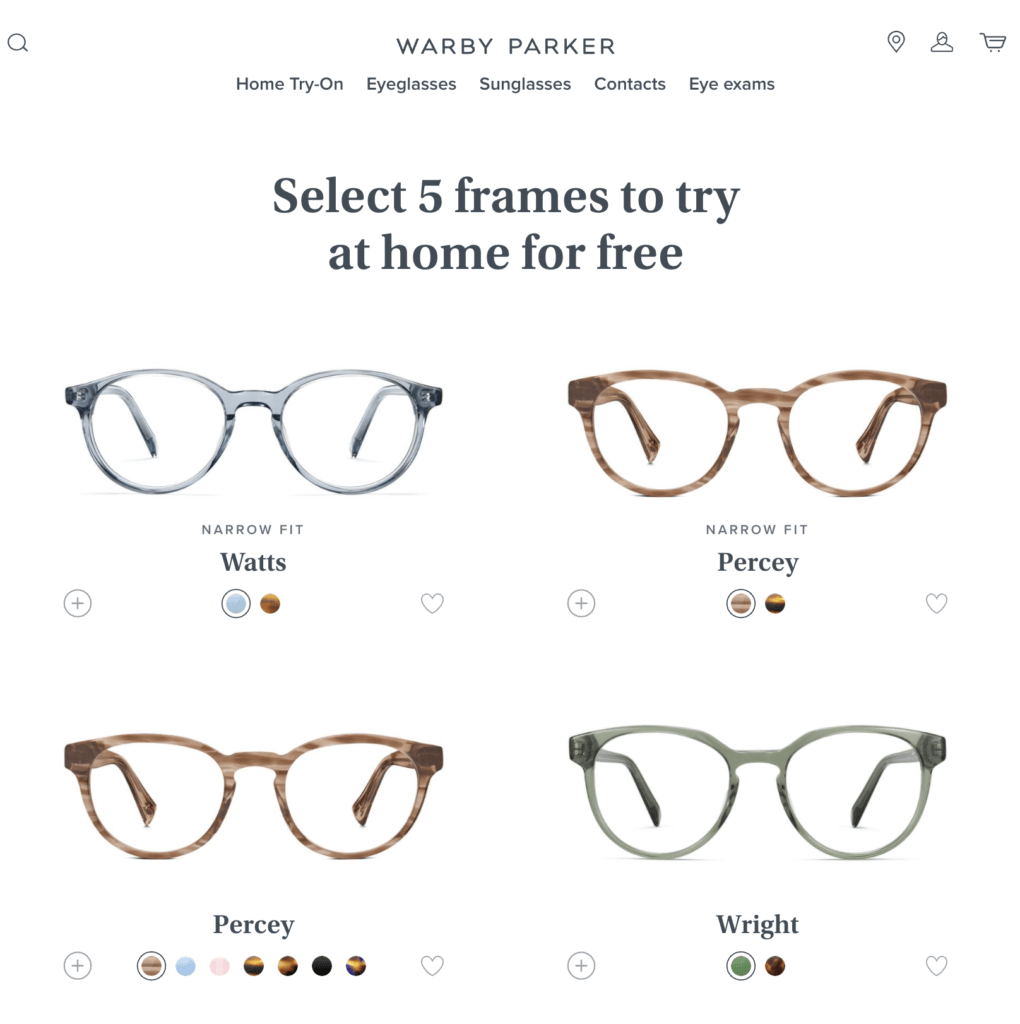
To better understand the ease of this shopping experience, contrast Warby Parker’s quiz to Felix Gray’s DIY shopping:
One option is to see all of their styles, with the broad categorization based on frame sizing:
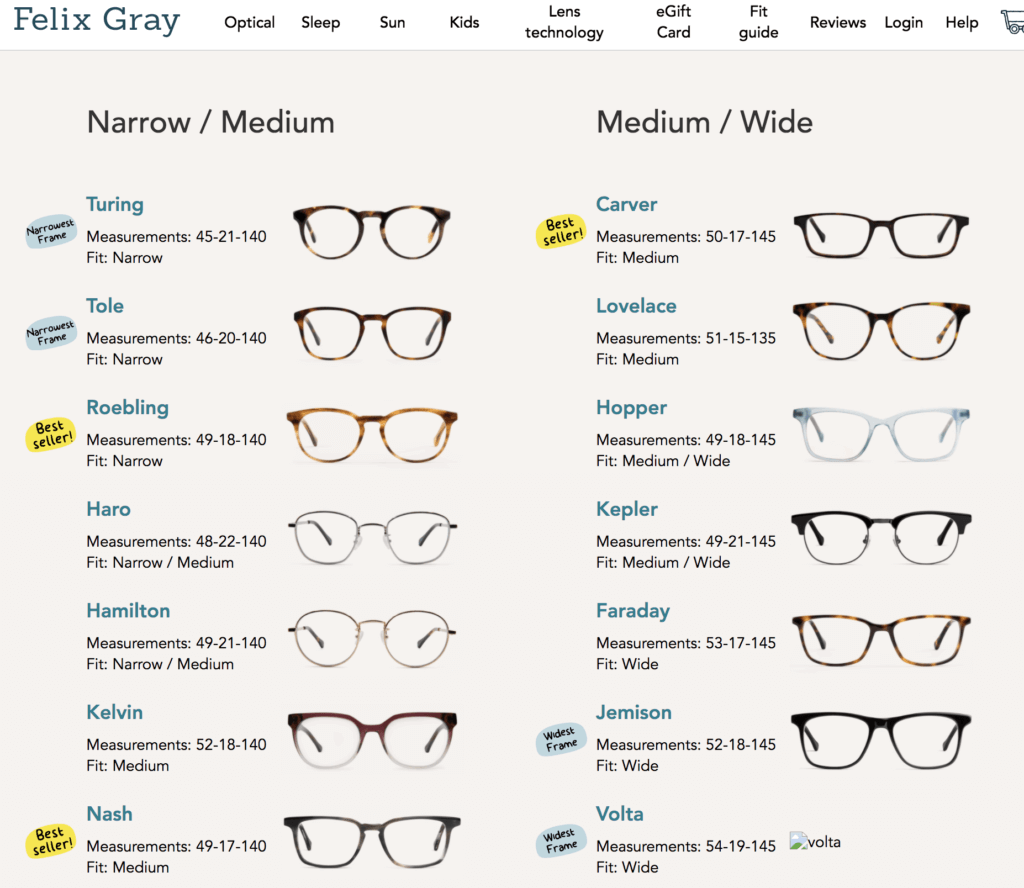
Or even more tedious is figuring out my face shape, what would look good on it, and scrolling up and down trying to figure out if the Roebling, Kepler, or Turing would be a good fit:
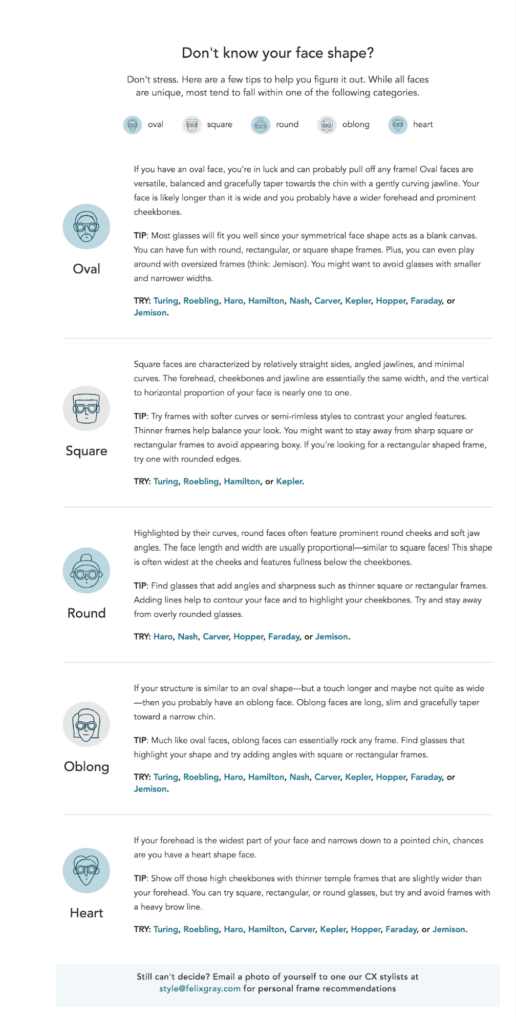
A list of products, without even a product image in sight, makes the path to purchase far more confusing, uncertain and frustrating. It would even be easier to have the shopper look at all of the product options at once, or just filter by “face shape”.
A similar challenge occurs with pairing with foundation finder–a short “quiz” to hone in on skin tone and undertone is a much smoother process than reading through a block or text and trying to figure it out.
Enjoying this article?
Subscribe to our newsletter, Good Question, to get insights like this sent straight to your inbox every week.
This becomes more challenging when there are a large number of SKU’s to match the skin tone to, which is the challenge that Fenty Beauty has (with 50 different shades of foundation).
The Fenty Shade Finder Quiz uses aspirational examples of models to help shoppers hone in on their shade:
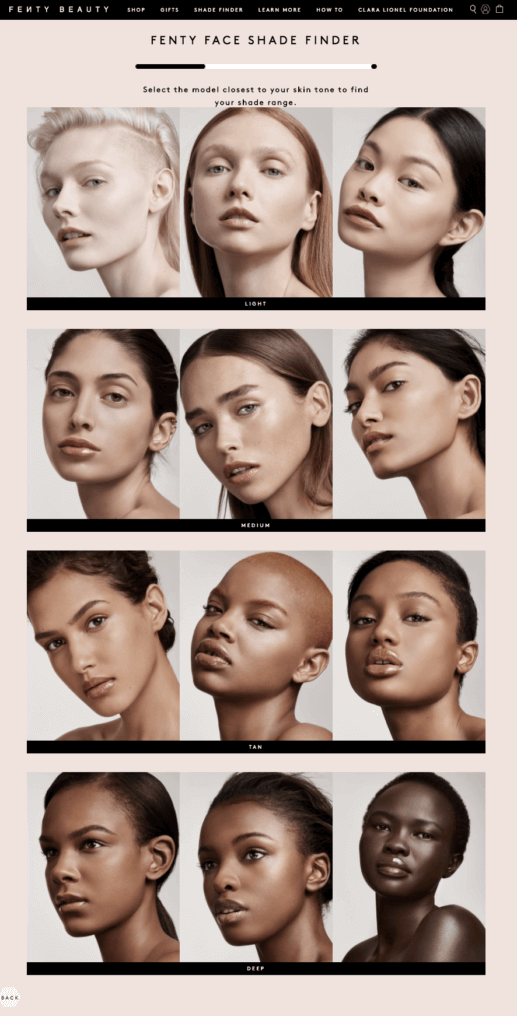
The Good: Create Bundles From The Start For Higher Average Order Value
Hawthorne is a subscription men’s personal care brand–shampoo, soap, deodorant, face wash, and other necessities to help keep guys clean.
The quiz is the backbone to their shopping experience — everyone needs to complete the quiz in order to identify their style and preferences before check out.
Questions dig in to skin type, challenges, concerns, general hygiene and routine:
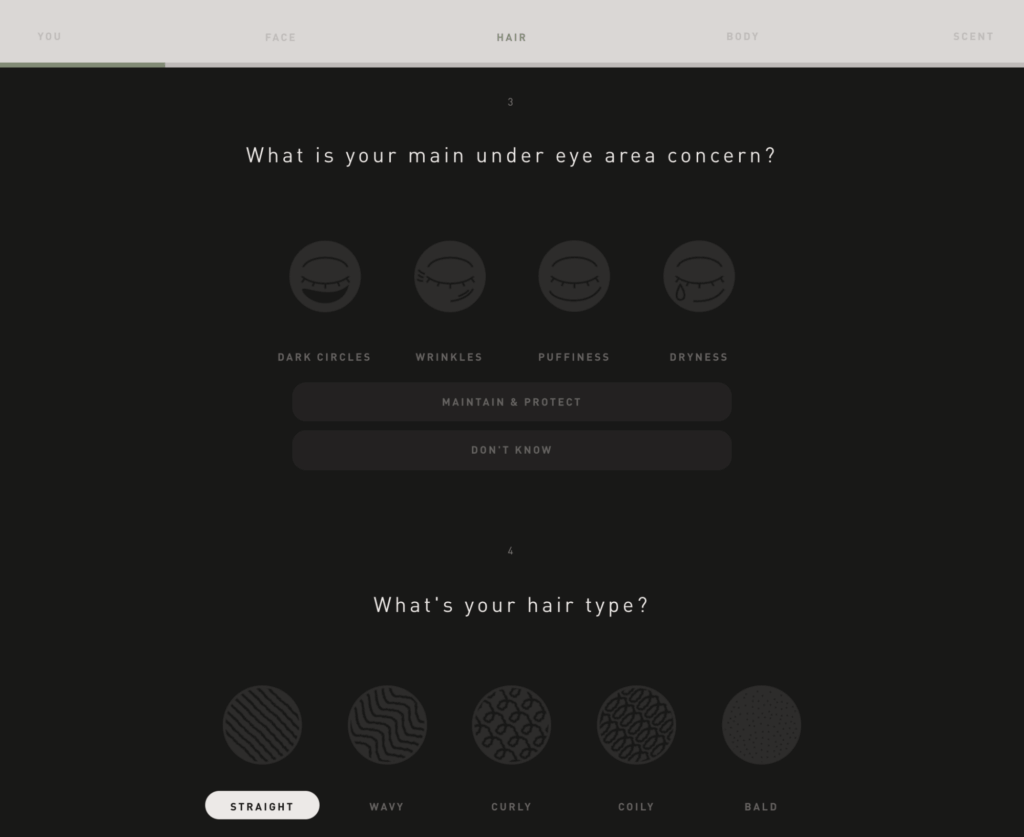
A few interesting observations:
- Hierarchy: the most comprehensive package (and the most expensive) package is at the top of the page, with a clear call-to-action button. As I scroll down the page, the average price of the product declines.
- Pre-determined frequency: One question in the quiz asked me about frequency of washing my face. From there, it is easy to estimate how long a face cleanser will last. And to encourage continued product usage and customer satisfaction, the refill arrives automatically. This can easily be changed here:
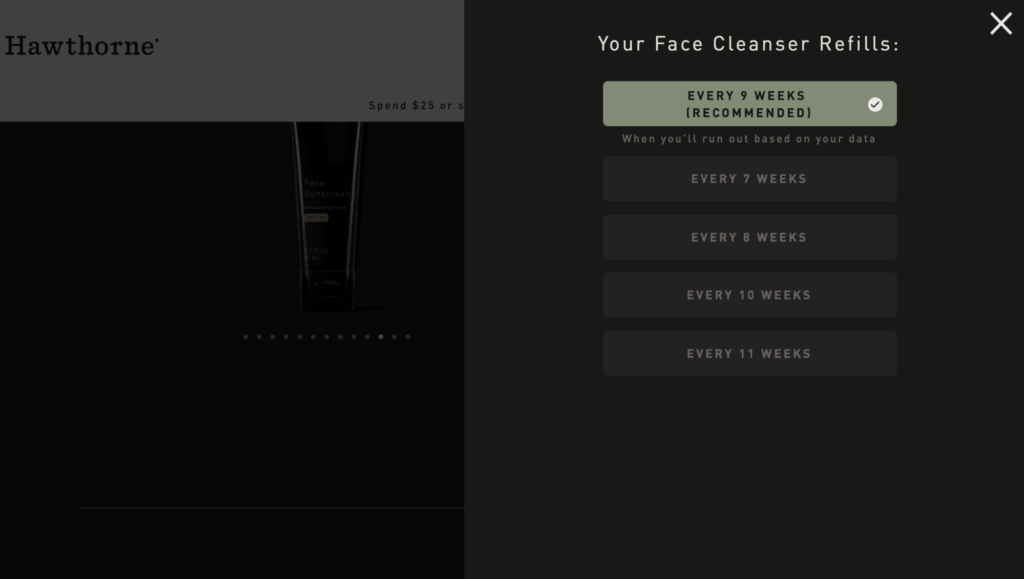
- Personalize with my name: My name is peppered throughout the product page, to reinforce the fact that these products are made for me, Gen. Furthermore, each of the products is described with “Your Formula” – reminding me that these are created based on my preferences and answers.
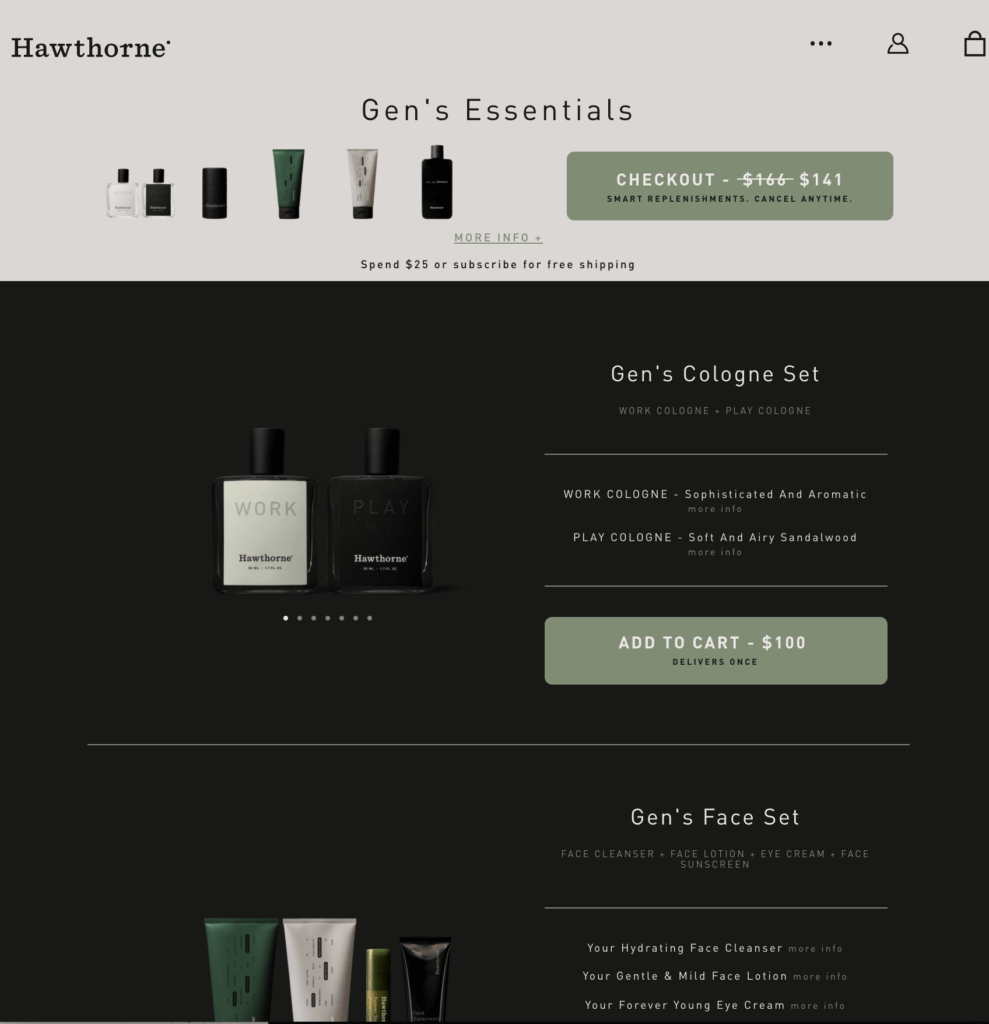
The Bad Experiences
The Bad: Failing To Remove Distractions
Remember back in middle school, if you had to take a quiz or test but you could hear kids shrieking and having fun in the playground right outside the window? The distraction lead to wandering thoughts, poorer concentration, and diminished performance.
The same applies to ecommerce quizzes.
Take pillow brand Slumbr’s quiz as an example.
The header, footer, email opt in, account log in, reviews tab and more are all around the quiz, creating a cluttered user experience and tempting a click to take the user away from the quiz funnel:
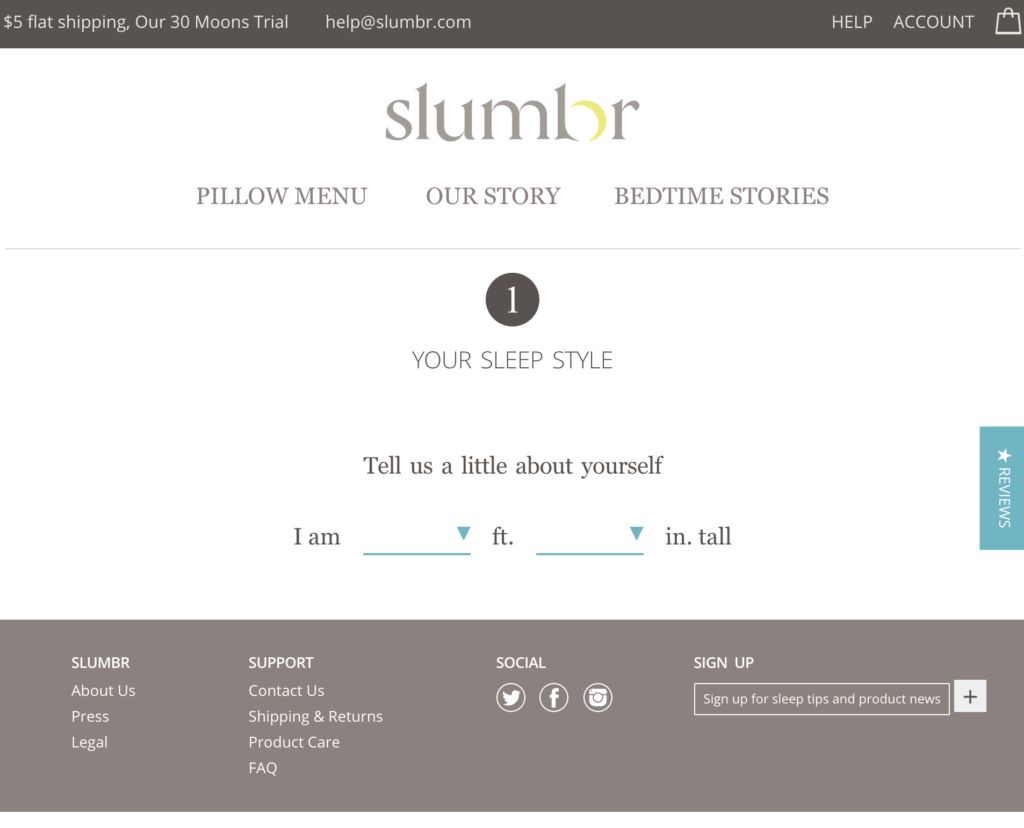
A quiz should be approached with the same focused user experience as a sign up page or a paid landing page that directs the user’s attention to only one thing: complete the quiz.
Helix Sleep does, where there is a clean user interface, no additional links on the page:
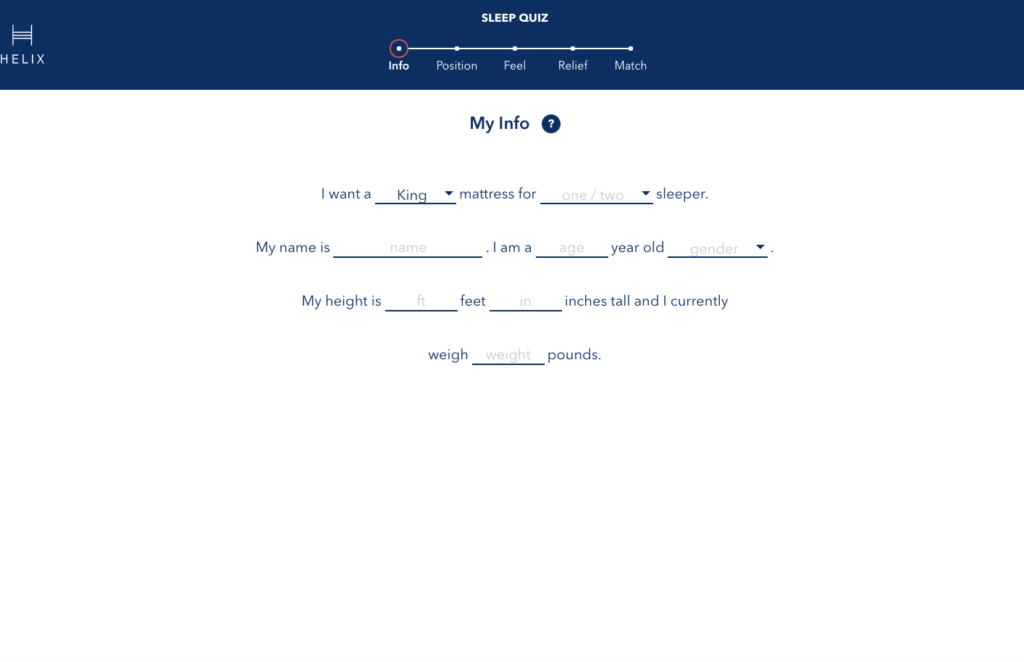
The Bad: Not Offering Multiple Ways To Filter
The benefit of a quiz is that it can quickly narrow down a large number of options into the few that match the buyer’s preferences.
Gaiam Yoga has many yoga mats, that differ based on size, material, thickness, print, and more. So this is a great use case for a quiz — based on skill, design preference, ideal price point and a few other inputs, Gaiam has the opportunity to cherry pick the best product and make it easy for the shopper to arrive at the right product.
And they have a quiz, to “help you find the perfect mat for your practice”:

The only problem is that it isn’t a quiz, so much as a filter.
What size do you need?
What thickness do you prefer?
What material do you prefer?
What style do you prefer?
These are all great quiz questions, but clicking on any of the these brings me directly to the product page. For example, if I select my style preference as “Printed”, I am brought to this page:
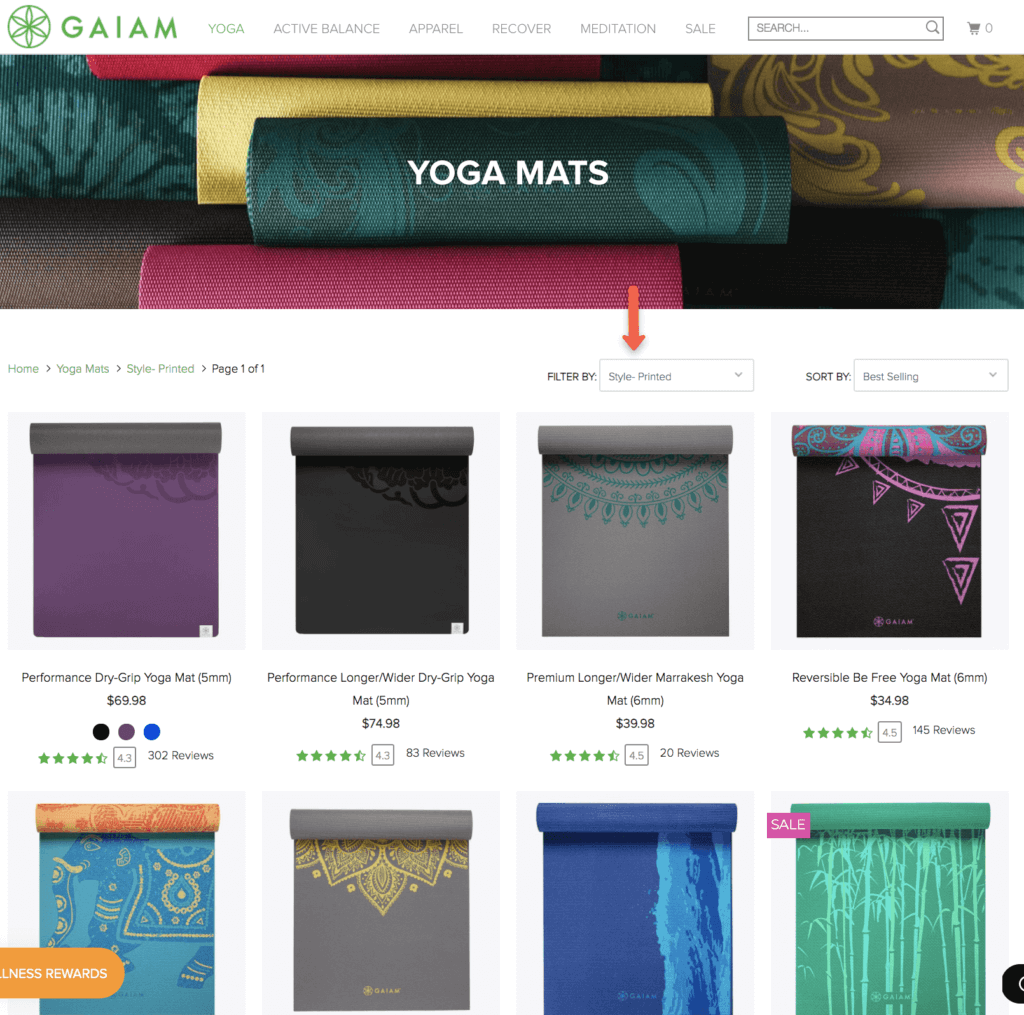
And there are no additional ways to filter the 50+ products here. It would be far easier if I could further narrow down based on the other parameters that are important to me.
Yoga Outlet has an example of refining all of the products by various filters:
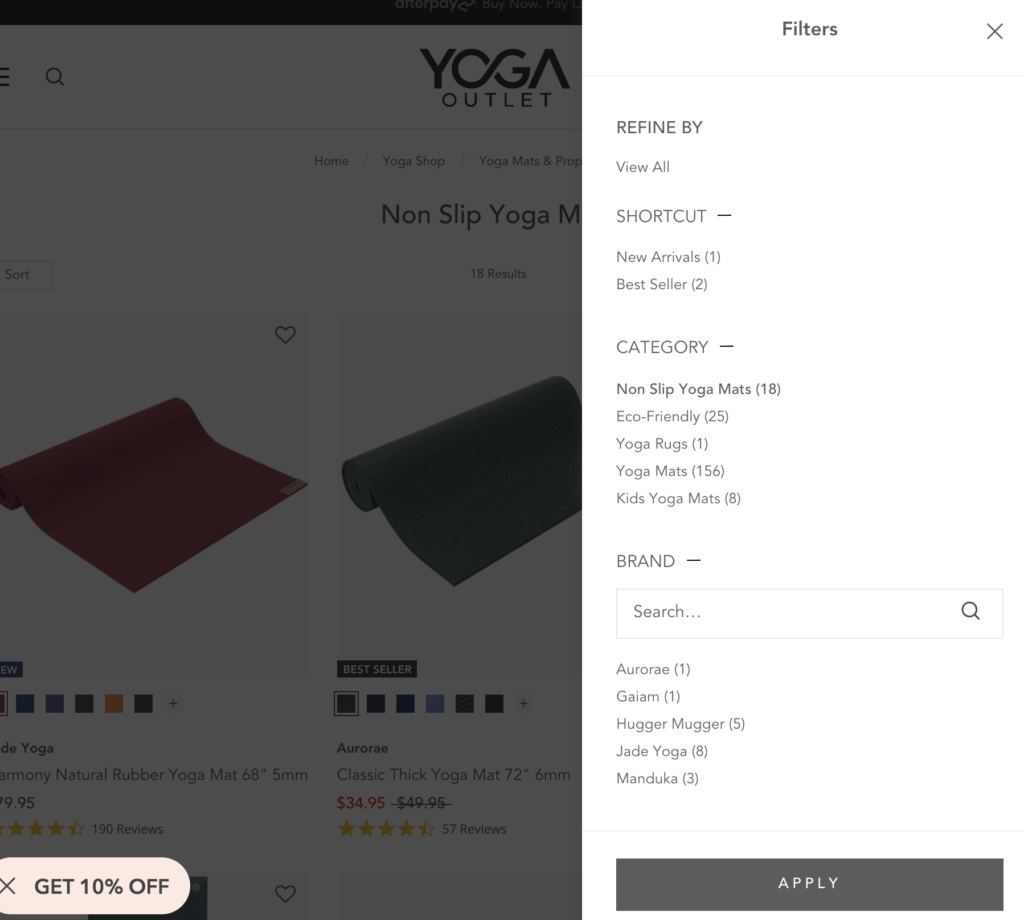
The Questionable
When it comes to clever and funny copywriting, I can’t think of a brand that outshines Poopouri. As a “poop-positive brand” that sells bathroom air fresheners, there are a bunch of scents in their bathroom aromatherapy.
So a quiz is a good method to usher shoppers to the right scent.
The only thing is, that the quiz questions are so disconnected from their product and the problem it solves, that it leaves me confused. How does my dream vacation, my favorite karaoke song, or my weekend activities correlate to my Poopouri scent?

Men’s soap brand Dr. Squatch also has an irreverent and humorous tone in their copy. And in their quiz, ask some questions that are questionable:
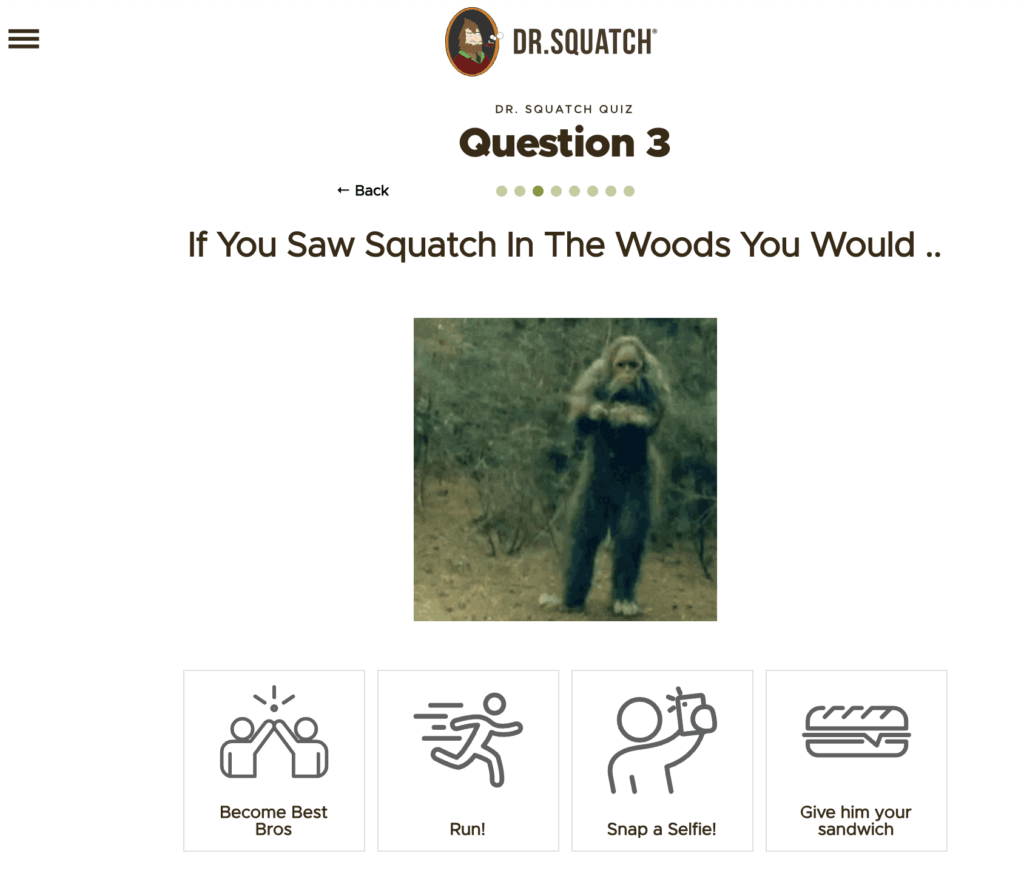
There is no harm in questions like these, as there are substantive questions that add insights into the customer’s preferences for smells and current health hygiene.
However, if every unnecessary click and wasted second contributes to drop off rate, are these quiz questions worthwhile?
It’s questionable.
So that wraps it up for the recap of how quizzes can be good, bad, or questionable.
What is a quiz that stands out in your mind as something noteworthy?

About the Author
Gen Furukawa
Gen Furukawa is Co-founder of Prehook and an occasional contributor to our blog. Looking for a tool to create interactive quizzes for your Shopify store? Feel free to hit Gen up on Twitter and let him know what's on your mind.